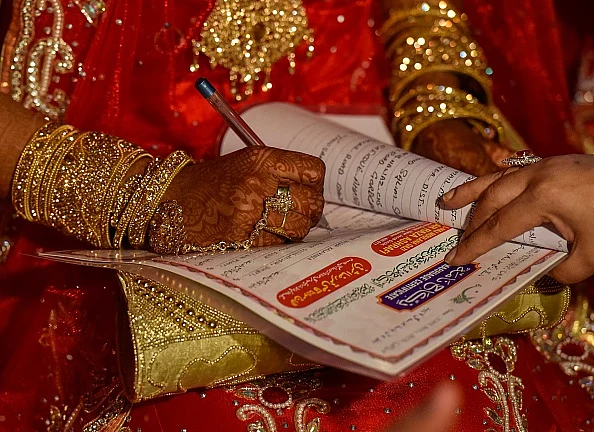The Assam government on February 23 made the major decision to repeal the state's 89-year-old Muslim Marriage and Divorce Registration Act of 1935. This law, enacted under British colonial rule, laid out the process for officially registering Muslim marriages and divorces within the state. A key amendment in 2010 made such registration compulsory, rather than voluntary.
Assam Muslim Marriage Act Repealed: A Bold Step Or Cultural Imposition?
Several experts challenge the notion that repealing this law will effectively address the child marriage issue.

The Muslim Marriage Act
Under the Act, the government granted licenses to Muslim leaders, known as kazis, to formally register these unions and dissolutions. The kazis acted as authorised registrars, deemed public servants. The law enabled Muslim couples to apply to them for marriage and divorce registration per the procedures outlined. Importantly, the Act aligned with Muslim personal law traditions.
The rationale presented by the BJP-led Assam government for this repeal is focused on prohibiting underage marriages. In public statements, Chief Minister Himanta Biswa Sarma cited provisions in the law that allow registration even if brides and grooms are under the legal marriage ages of 18 and 21 years respectively. He portrayed abolishing the Act as a vital step toward eradicating child marriage practices by 2026 statewide.
Some advocates of the law's repeal also described it as obsolete and informal, claiming the registration system leaves room for violations of current legal norms. They argue kazis have misused their powers at times, enabling unacceptable practices like child marriages and divorce without established grounds. Replacing the Act with the Special Marriage Act, they say, would ensure better compliance.
However, several experts challenge the notion that repealing this law will effectively address the child marriage issue. They point out that the government could have simply amended the concerning sections enabling underage registration, rather than abolishing the Act entirely. Some predict this will only lead to more unregistered marriages, including those involving minors.
They advocate keeping the law intact and highlight how it provided a decentralized, relatively simple marriage registration process. With nearly 100 government-authorized kazis spread across Assam, even poor and illiterate couples in rural areas could feasibly register unions. However, the proposed Special Marriage Act replacement involves more complex procedures through District Commissioner offices. These include one-month notice periods and extensive documentation prerequisites that may preclude many couples from registration.
In the absence of authorized kazis, some fear unchecked local religious leaders will dominate marriage registration domains. Without oversight and regulation, a major argument is that practices like child marriage could potentially increase unabated.
Beyond the stated child marriage concerns, many see political motivations behind repealing this Act at this time. Assam's population includes a sizable minority of Muslims, approximately 34% as per the 2011 census. Most trace their origins to Bangladeshi migrant families. Assamese nationalist politics has long positioned this demographic as a threat to the state's culture and ethno-linguistic identity.
In recent years, the ruling BJP party has made intensifying efforts to address the complexities related to Shifting population demographics in Assam. Beyond the Muslim marriage law repeal, these include mass arrests of mostly Muslims in anti-child marriage raids, proposals to criminalize polygamy, and initiatives to limit welfare benefits for larger families. The government has also repeatedly affirmed its aim of soon instituting a Uniform Civil Code, with exemptions for tribal groups only.
Broader Implications
According to Ranjan Mishra, an Advocate practicing in Karkardooma Court, replacing the Muslim Marriage Act with the Special Marriage Act could disproportionately impact vulnerable groups in Assam. Ranjan argues that the simpler decentralized procedures under the Muslim Marriage Act were more accessible for rural, lower-income couples with less education and resources. However, the Special Marriage Act involves more complex bureaucratic channels like documentation requirements and month-long waiting periods.
"We're concerned that poor, illiterate couples will struggle to navigate these new hurdles to register their marriages," said the Advocate. "This could lead to a rise in unregistered marriages."
They also noted that unregistered marriages tend to negatively affect women the most in terms of legal protections and rights. "Without proper registration safeguards in place, women are vulnerable if the marriage falls apart or the husband dies," Mishra added.
-
Previous Story
 Kolkata Rape & Murder Case: Guv Bose Calls Emergency Meet After Ex-cricketer Harbhajan Singh’s ‘Heartfelt Plea’
Kolkata Rape & Murder Case: Guv Bose Calls Emergency Meet After Ex-cricketer Harbhajan Singh’s ‘Heartfelt Plea’ - Next Story



















